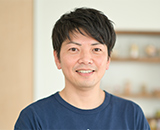
Award summary
Rett syndrome is a progressive neurological disease that mainly affects girls, usually becoming apparent between the ages of six months and one year and six months. It is a nationally designated intractable disease with no established treatment method. The syndrome is characterized by the deterioration of motor function and the constant repetition of hand-rubbing movements. It is associated with different disorders such as epilepsy and scoliosis. Rett syndrome occurs in one out of 10,000 to 15,000 people. It is estimated that there are 3,000 to 5,000 patients with Rett syndrome in Japan.
Saho Tanioka, a second-year junior high school student and the oldest daughter of Tetsuji Tanioka, an office worker living in Hirakata-shi, Osaka, often put her hand into her mouth before she was one year old and became unable to crawl on her belly. She was tested at a general hospital but the cause of the problem remained unidentified. One day during a follow-up, Mr. Tanioka learned of Rett syndrome on the Internet. His daughter visited a specialist in Fukuoka and was diagnosed as having Rett syndrome. This was in August 2010 when Saho was two years old.
The doctor said there was no established method for treating Rett syndrome and the research was still in a rudimentary stage. Mr. Tanioka heard that, in Western countries, patient organizations raised enormous amounts of funding for research, actively support research and engaged in awareness-raising activities. This prompted him to do something by himself instead of relying on someone else to cure the disease like he had been doing at that time. In April 2011, he set up the Rett Syndrome Organization Japan (RSOJ) nonprofit organization. As its representative director, he started activities aimed a facilitating the interaction of Rett Syndrome patients and family members, being a bridge between patients and researchers and providing grants for research aimed at establishing treatment methods or developing therapeutic drugs. Previously, many organizations that facilitates patient interactions had existed in Japan, but none of them had gone so far as to support research. In that regard, RSOJ is unprecedented.
Having set the goal of completely curing Rett syndrome, Mr. Tanioka met related researchers around the country while patients communicated their willingness to support research, building good relationships. At the same time, he collected through media appearances and awareness-raising activities, such as lectures, to enable many people to learn about Rett syndrome. They began providing two-million-yen grants to successful applicants annually in 2014. To date, they have provided a cumulative total of 14 million yen in grants. Once a year, the RSOJ holds a symposium that patients' families, supporters and researchers participate in where they discuss topics such as the progress of research and future prospects. An international symposium was held in 2017 that researchers from five different countries were invited to attend, and 400 people attended the event. Today, nearly 80 families of patients from around the country participate and there are 25 cooperating companies and organizations.
Rett's communication, an app that enables patients and their family members to share disease-related information, was made available for free in 2021, gaining about 200 subscribers in two months. The goal is to encourage as many patients as possible to register information about the condition of their disease using an application that is more user-accessible. Compiling a database of the information and providing it to researchers should be helpful in developing therapeutic drugs.
Ten years after the establishment of RSOJ, it built connections with major Japanese researchers. The connections should, Mr. Tanioka says, also encompass pharmaceutical companies. He hopes to make a step toward the development of therapeutic drugs within the next decade.
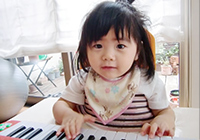 Ms. Saho became unable to crawl before she turned one year old. She was unable to keep sitting without support
Ms. Saho became unable to crawl before she turned one year old. She was unable to keep sitting without support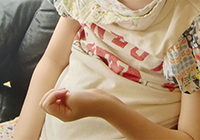 Rett syndrome, a neurological disease, is caused by a genetic mutation.
Rett syndrome, a neurological disease, is caused by a genetic mutation.The syndrome is characterized by the regression of motor functions and the repetition of hand-rubbing behavior.
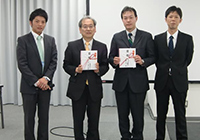 Wishing to support the research, people close to the patient collect donations?and use the funds to provide grants for research aimed at establishing a treatment method or developing a therapeutic drug.
Wishing to support the research, people close to the patient collect donations?and use the funds to provide grants for research aimed at establishing a treatment method or developing a therapeutic drug.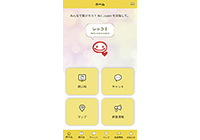 Rett's Communication, an app allowing patients and their families to share disease-related information, has been developed.
Rett's Communication, an app allowing patients and their families to share disease-related information, has been developed.Registered information is provided to researchers for use in the development of therapeutic drugs.
Reasons for this award
Soon after his daughter was diagnosed with an intractable disease, Mr. Tanioka set up an NPO and has engaged in a broad range of activities during the last decade, such as the development of patient information, the holding of seminars and symposiums, the awarding of research grants and the creation of an app. We were moved by his ability to act and put plans into practice. Most of all, we are impressed by his desire as a parent to do everything that he can for his daughter. Very importantly, this initiative has saved many patients and their families and been a bridge between researchers and patients in Japan and overseas.
Comments from the winner
Ten years have passed since April 2011. An NPO whose activities were based on supporting research into Rett syndrome was something that I hadn't had an opportunity to be involved in at all. I started from scratch and I have frantically devoted myself to it. In the process, I found that I have gained more likeminded friends and supporters around the country and the activities have broadened gradually. I have always moved forward with the support of many people. The result of this is the winning of this historic, great award this year. My feeling of gratitude to all of you will be shown in the things that we do to support Rett syndrome patients. We very much appreciate your continuing to pay warm attention to our activities,






